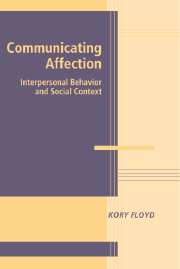Book contents
- Frontmatter
- Contents
- List of Tables
- List of Figures
- Foreword
- 1 AN INTRODUCTION TO AFFECTIONATE COMMUNICATION
- 2 THINKING ABOUT AFFECTION: THE THEORIES
- 3 ENCODING AFFECTIONATE MESSAGES
- 4 DECODING AND RESPONDING TO AFFECTIONATE EXPRESSIONS
- 5 BENEFITS OF EXPRESSING AND RECEIVING AFFECTION
- 6 RISKS ASSOCIATED WITH AFFECTIONATE COMMUNICATION
- 7 A NEW THEORETIC APPROACH
- 8 AFFECTIONATE COMMUNICATION IN HUMAN INTERACTION
- References
- Index
2 - THINKING ABOUT AFFECTION: THE THEORIES
Published online by Cambridge University Press: 02 December 2009
- Frontmatter
- Contents
- List of Tables
- List of Figures
- Foreword
- 1 AN INTRODUCTION TO AFFECTIONATE COMMUNICATION
- 2 THINKING ABOUT AFFECTION: THE THEORIES
- 3 ENCODING AFFECTIONATE MESSAGES
- 4 DECODING AND RESPONDING TO AFFECTIONATE EXPRESSIONS
- 5 BENEFITS OF EXPRESSING AND RECEIVING AFFECTION
- 6 RISKS ASSOCIATED WITH AFFECTIONATE COMMUNICATION
- 7 A NEW THEORETIC APPROACH
- 8 AFFECTIONATE COMMUNICATION IN HUMAN INTERACTION
- References
- Index
Summary
They do not love that do not show their love.
– William ShakespeareTo fully appreciate the implications of social scientific research, one must begin with both a working knowledge and a critical assessment of the theory or theories in which that research is grounded. For two reasons, this is particularly important for understanding the research on affectionate communication. First, a great deal of the research has been exploratory and atheoretic. This is not problematic in principle, but it ought to encourage consumers of this research to consider the theoretic implications that findings from such studies might have. Second, the theory-driven research on affectionate communication has used multiple theories that represent considerable diversity in assumptions and foci. This requires that the conscientious reader exercise caution when comparing studies to each other.
The literature on affectionate communication is a theoretically eclectic one, and there are at least two reasons why. One is that researchers studying affectionate communication have directed their attention toward a diversity of questions, so theories that are useful in one area have not necessarily been useful in others. For instance, theoretic principles that can explain why a given affectionate behavior is or is not reciprocated during an intimate exchange may not be able to explain why highly affectionate people have greater immunocompetence than their less affectionate counterparts. The second, and perhaps more important, reason is that, before now, there has not been a comprehensive theory about affectionate communication to use.
- Type
- Chapter
- Information
- Communicating AffectionInterpersonal Behavior and Social Context, pp. 9 - 27Publisher: Cambridge University PressPrint publication year: 2006

